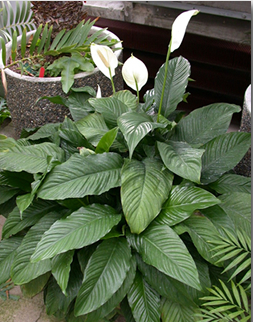Peace Lilies
White Anthurium • Spathe Flowers • Spathiphyllum

The Peace Lily (Spathiphyllum) is a beautiful foliage plant that also produces attractive white spathes. This plant has a high transpiration rate and enjoys the large water reservoir that hydroculture offers. It possesses all the qualities to make it one of the best indoor plants.
💡 Perfect for mid-light to shade conditions
Effective Air Purifier
The Peace Lily excels in removing harmful air pollutants, making it a most valuable houseplant.
Removes These Toxins:
Safety Around Pets & Birds
Scientific Information
- Scientific Name: Spathiphyllum / Araceae
- Toxic Principle: Calcium oxalate crystals
Clinical Signs
- • Vomiting and digestive irritation
- • Oral burning and swelling
- • Rashes and redness
- • In birds: difficulty swallowing
Reference: OSU Center for Veterinary Health Sciences
Care Guide
Size & Growth
Typical Size: 1-4 feet tall and wide
'Sensation' Variety: Up to 6 feet tall
Light Requirements
✅ Bright, filtered light (preferred)
✅ Low light (will survive)
❌ Direct sunlight (will cause sunburn)
Watering
• Keep soil moist but not soggy
• Allow soil to dry between waterings
• Use room temperature water
Temperature
Day: 68-85°F (20-29°C)
Night: About 10°F cooler
Fertilizing
Balanced liquid fertilizer (20-20-20) every 2-3 months
Cleaning
Wipe leaves regularly with damp cloth to remove dust
Soil
Any well-drained potting mix
Popular Varieties
'Sensation'
Largest variety with dark green, ribbed texture. Durable and versatile.
Size: Up to 6 feet'Mauna Loa'
Medium-sized with glossy, lance-shaped leaves. Flowers up to 4 inches wide.
Size: 2-3 feet'Wallisii'
Compact and vigorous with delicate 3-inch blooms.
Size: 12 inches'Supreme'
Large 7-inch oval snow-white blooms held high above foliage.
Size: Medium'Flower Power'
Large flowers well above foliage with distinctive lance-shaped leaves.
Size: Medium'Starlight'
Striking, shiny, tough dark green foliage.
Size: MediumCommon Problems & Solutions
Lack of Flowering
Usually occurs on plants less than a year old or receiving insufficient light.
Cold Sensitivity
Very sensitive to temperatures below 60°F. Avoid chilling temperatures.
Overwatering
Root and stem diseases are usually associated with overwatering.
Pest Issues
Watch for mealybugs (most common), mites, and scales.
Information prepared by Marjan Kluepfel, HGIC Information Specialist, and Bob Polomski, Extension Consumer Horticulturist, Clemson University.
Information contained on this website is provided as general reference only. For application to specific circumstances, professional advice should be sought.
GreenAndHealthy.Info strives to maintain accurate and up-to-date information; however, mistakes do happen. If you would like to correct or update any information, please contact us.